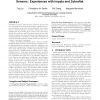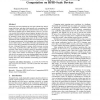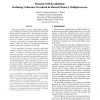25 search results - page 2 / 5 » Energy evaluation of software implementations of block ciphe... |
MOBISYS
2004
ACM
14 years 7 months ago
2004
ACM
ZebraNet is a mobile, wireless sensor network in which nodes move throughout an environment working to gather and process information about their surroundings [10]. As in many sen...
CHES
2010
Springer
13 years 8 months ago
2010
Springer
The need for lightweight (that is, compact, low-power, low-energy) cryptographic hash functions has been repeatedly expressed by application designers, notably for implementing RFI...
ASPLOS
2011
ACM
12 years 11 months ago
2011
ACM
Transiently powered computing devices such as RFID tags, kinetic energy harvesters, and smart cards typically rely on programs that complete a task under tight time constraints be...
MICRO
2009
IEEE
14 years 2 months ago
2009
IEEE
The phase-change random access memory (PRAM) technology is fast maturing to production levels. Main advantages of PRAM are non-volatility, byte addressability, in-place programmab...
ISCA
1995
IEEE
13 years 11 months ago
1995
IEEE
This paper introduces dynamic self-invalidation (DSI), a new technique for reducing cache coherence overhead in shared-memory multiprocessors. DSI eliminates invalidation messages...



